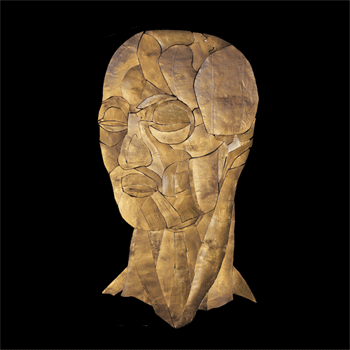|
|||||||||
MG V9 / Bôłt BR1063: ROBERT PIOTROWICZ "EUZEBIO"
Side A
To Fleh
Euzo Found Guitar
Flares Et Wasser Hole
Side B
Elektros Spong
Ocarina Wars
PREVIEW
All sounds performed and recorded by Robert Piotrowicz on Buchla and Serge synthesizers at EMS Elektronmusikstudion in Stockholm 2013/2014.
composed, mixed and premastered by Robert Piotrowicz
artwork and photos: Robert Piotrowicz
design and layout: Lasse Marhaug
special thanks: Ocarina Jones and Tomasz Gil
mastered and cut by Rashad Becker at D&M Berlin
Produced by Musica Genera
| The body of Euzebio was found all covered in mud. Small devices attached to his limbs were soaked in water but still produced some sounds neither of speech, nor of the humming spong. Suddenly, when some toad or a redstart slurped, he got up suddenly, and everything started again. — Mircea Eliade "Euzebio, The Man Who Did Not Exist, Yet Still Shook The Forest" |
The new album by Robert Piotrowicz does not fit any category. What this multicoloured electronic instrumentation aims to channel is the acoustic experience and energy of the performing musician.
As a result of a wide range of creative means used, the narrative language of the compositions bursts with tension and mystery.
The album includes slow hypnotic passages of stone electronics (To Fleh), vigorous tempos and circular repetitions (Euzo Found Gitar), sprawling artificial soundscapes, back-to-origins ethnicity (ethnical subsoil and elements) liberated from any geographical identity (Ocarina Wars), as well as dreamlike minimalism with unpretentious cinematographic traits (Flares Et Wasser Hole). Some of these unusual melodic patterns may resemble the corporality of the animal throat rather than any human-created instrument (Electros Spong).
Although Euzebio was recorded with synths, the final shape of individual tracks and the album's overall acoustic image go far beyond any electronic genre. The instruments have not become a goal in itself. They were merely a building block, a tool that helped achieve the album's extended structure - a diverse whole with rich spatial features.
- - -
When repeating that what is not perfect, Euzebio is never tainted by a routine. He makes a risky and flamboyant creative gesture without any hesitation, because he knows that if he repeats his gestures long enough, he will succeed. Ubiquitous corporal multiplication is based on a community-shared phantasm which produces an interiorized narrative.
By finding the guitar or creating the spong, impulsive Euzebio avoids being trapped in easy references and does not seek his opportunities in eclectic rock or equatorial drumming. You can almost hear him fleeing, sometimes drenched in code. During their sound rituals, communities competing for the Spong of the Year synthesize a scenery of fictional villages. When dozing off in a shack, Euzebio himself becomes a scenery of the self-transforming body that strives to fill space in an unstoppable, omni-intimate movement.
| Ciało Euzebia odnaleziono całe pokryte błotem. Z przemoczonych, małych urządzeń, które miał przytroczone do kończyn wciąż dobywał się jakiś dźwięk. Ni to mowa, ni to mruczący spong. Nagle mlasnął jakiś kumak, czy horychwistka, on znów się poderwał i zaczęło się od nowa. — Mircea Eliade "Euzebio, człowiek, który nie istniał, a targał borem" |
Nowa płyta Piotrowicza nie należy do konkretnej kategorii. Wielobarwna elektroniczna instrumentacja modelowana jest w stronę doświadczenia akustycznego i żywiołu performującego muzyka. Narratywny, pełen napięcia i tajemnicy język kompozycji to wynik szerokiego spektrum środków.
Powolne transowe pasaże "stone" elektroniki (To Fleh), żywiołowe tempa i cyrkuliczne powtórzenia (Euzo Found Gitar), rozłożyste pejzaże sztucznej dźwiękowej natury, etniczna źródłowość wyzwolona z geograficznej identyfikacji (Ocarina Wars). Oniryczny i bezpretensjonalnie kinematograficzny minimalizm (Flares Et Wasser Hole). Nieoczywista melodyka, którą łatwiej skojarzyć z cielesnością zwierzęcego gardła, aniżeli z konkretnym instrumentem stworzonym przez człowieka (Electros Spong).
Euzebio to album nagrany na syntezatorach, jednak ostateczny kształt poszczególnych utworów i obraz dźwiękowy całości daleko wykracza poza ramy elektronicznej gatunkowości. Instrument nie stanowi tu celu samego w sobie, lecz staje się narzędziem poszerzonej formuły, budulcem bogatej przestrzennie i różnorodnej płyty..
- - -
Powtarzając niedoskonałe, Euzebio nigdy nie jest zadrapany przez rutynę. Ryzykując pysznym formatywnym gestem, robi to bez obaw, ponieważ jeśli będzie powtarzał swoje gesty dostatecznie długo, może być pewien powodzenia. Wszechobecne, cielesne zwielokrotnienie, powołuje się na wspólnotowy fantazmat, który odpowiada za interioryzowaną historię.
Odnajdując gitarę, czy konstruując spong, gwałtowny Euzebio wypiera pułapkę odniesienia, nie szuka swoich szans w elektrycznym rocku, ani równikowym bębnieniu. Prawie słychać jak ucieka, czasem obłocony kodem. Walczące o Spong Roku, społeczności rywalizujące obrządkiem dźwiękowym syntetyzują panoramę fikcyjnych osad. Przysypiając w szałasie, Euzebio sam staje się krajobrazem reformującego się ciała, które aspiruje do wypełnienia przestrzeni, nie zatrzymanym pan intymnym ruchem..
